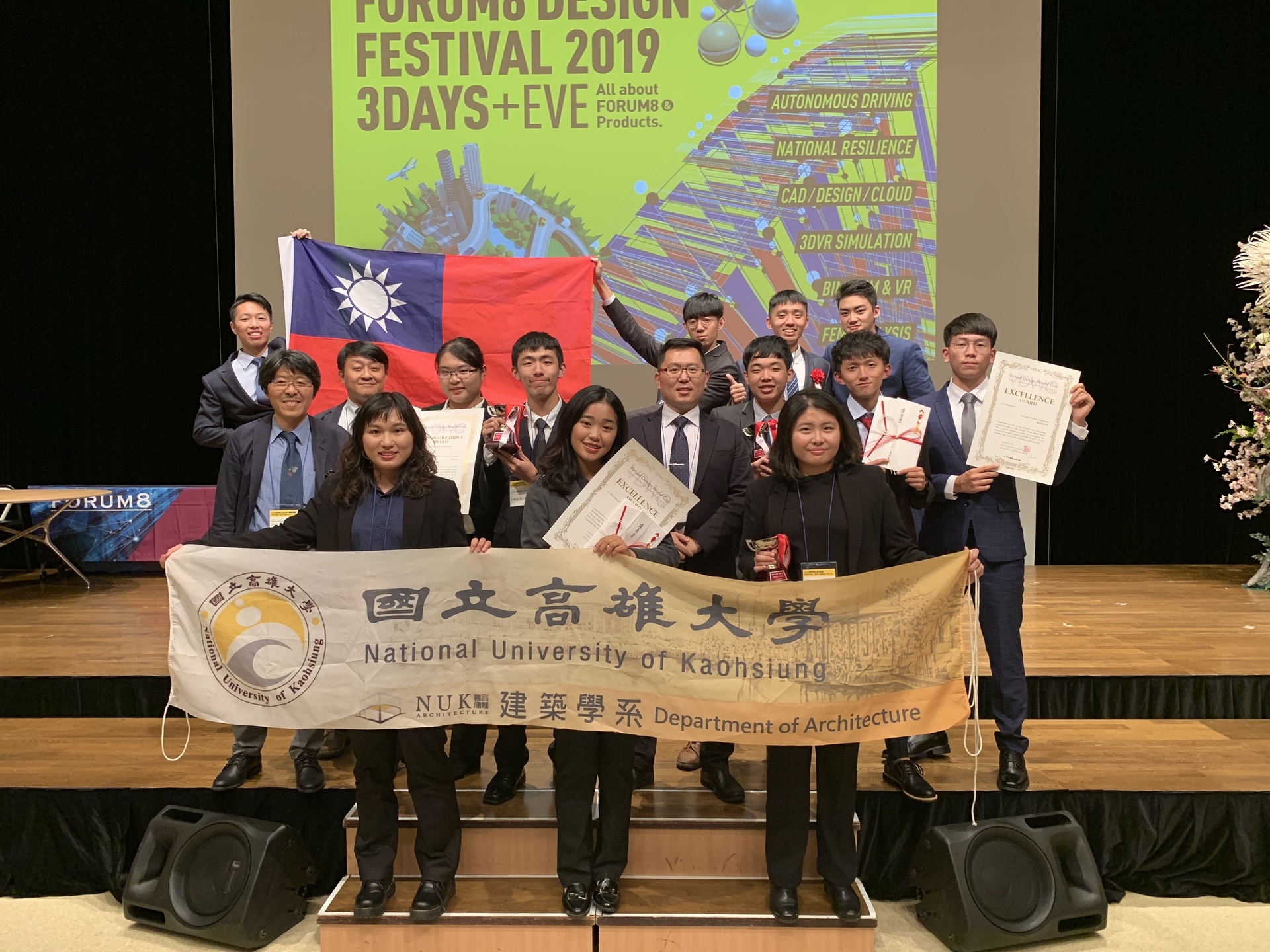Department of Architecture建築學系
 Website
Website
About US
The establishment of the Department of Architecture at National Kaohsiung University aims to balance the educational resources of architecture and urbanism in the north and south of Taiwan, and to provide a think tank for the knowledge and talent training for Taiwan to face future environmental challenges. The predecessor of this department was the Institute of Urban Development and Architecture, which was established in 2002, the same year as the university. It currently has three academic systems: undergraduate, graduate, and in-service master's programs. The total number of alumni over the years has reached more than 600, and they serve as important positions in central ministries and local governments, or as professionals such as architects, urban planning technicians, and landscape designers. The department enrolls 35 undergraduate students, 18 graduate students, and 17 in-service master's programs each year. There are 9 full-time teachers with doctoral degrees from well-known universities at home and abroad, as well as many part-time teachers and administrative assistants with professional qualifications such as architects and urban planning technicians. The teaching content is both theoretical and practical. The teaching characteristics of the undergraduate department, based on the core courses, will establish professional indicators such as "design planning", "digital construction", "green architecture", "engineering technology" and "historical culture" as the basis for training and teaching. The graduate school focuses on research fields such as "urban and rural sustainable planning", "wood structure architecture", "cultural heritage preservation and maintenance", "smart architecture and city", "architecture and urban history theory", "material science", "engineering project management" and "architecture and urban disaster prevention" to cultivate a new generation of space professionals who can respond to future trends. In addition, the department continues to incorporate contemporary issues into its courses, including artificial intelligence (AI), environmental, social, and governance (ESG), serious games, extended reality (XR), etc., in order to keep up with the times and connect with the latest research.
本系的成立旨在均衡台灣南北地區建築與都市學門的教育資源,以及提供台灣面對未來環境挑戰上的知識與人才培育的智庫所在。本系的前身原為於2002年與本校同年成立的都市發展與建築研究所,目前設有大學部,以及研究所的碩士班與碩士在職專班等三個學制。歷年校友累計已達600餘人,分別擔任中央部會與各地方政府要職,或建築師、都市計畫技師和景觀設計師等專業人員。本系每年招收大學部35人,研究所碩士班18人,碩士在職專班17人。師資上共有9位具國內外知名大學博士學位的專任教師,以及多位具建築師、都市計畫技師等專業資格的兼任教師與行政助理。 教學內容兼具理論與實務,大學部的教學特色,在核心課程的基礎上,將建立「設計規劃」、「數位構築」、「綠色建築」、「工程技術」與「歷史文化」等專業指標,作為培養教學依據。研究所的部分,則針對「城鄉永續規劃」、「木構造建築」、「文資保存與維護」、「智慧建築與城市」、「建築與都市史論」、「材料科學」、「工程專案管理」及「建築與都市防災」等研究領域,培養因應未來趨勢的新世代空間專業人才。此外,本系也持續將當代最新議題帶入課程,包括人工智慧(A.I., Artificial Intelligence)、環境社會和公司治理(Environmental, social, and governance,ESG)、嚴肅遊戲(serious game)、延展實境(Extended reality, XR)等,以達到與時俱進跟最新研究接軌。

學域分組
「建築與都市史論」主要探討建築和城市發展的歷史脈絡,從過去到現代,分析不同時期的建築風格、技術和社會背景如何影響城市的形態和功能。此領域旨在培養學生對建築和城市發展的歷史理解,並能夠批判性地分析和應用這些知識於建築和都市設計中。
「創新低碳木建築設計」著重於利用木材這一可再生、低碳的建材來減少建築過程中的碳排放。木材在生長過程中吸收二氧化碳,並將其固定在木材結構中,因此使用木材作為建築材料有助於減少溫室氣體排放。這些創新技術和方法不僅提升了木建築的性能和應用範圍,還為實現低碳、可持續的建築目標提供了重要的解決方案。
數位創新與先進構造的重點在於結合數位科技與先進建築技術,以提升建築設計與施工的效率和品質。這包括運用虛擬實境(VR)和擴增實境(AR)技術進行設計模擬,利用建築信息模型(BIM)進行精確的施工規劃,以及採用先進材料和施工方法來提高建築物的耐久性和環保性能。
智慧資訊建築(Intelligent Information Architecture)是一個結合建築設計與資訊科技的跨領域領域。智慧資訊建築的目標是通過技術創新,提升建築物的功能性、舒適性和可持續性,為使用者創造更好的生活和環境。
「建築與都市防災」的核心在於如何通過設計和規劃來減少自然災害對城市和建築物的影響。這包括「法規檢討」、「材料測試」、「防災規劃」、「數據實驗」,這些措施共同作用,能夠有效減少災害帶來的損失,保護居民的生命和財產安全。
「環境控制與綠色建築」是現代建築設計中的重要概念,旨在減少建築對環境的負面影響,並提升建築物的能源效率和可持續性。這些概念包括幾個關鍵點:1.能源效率、2.水資源管理、3.室內環境品質、4. 材料選擇、5.廢棄物管理。這些措施不僅有助於保護環境,還能降低建築物的運營成本,提升其長期價值。
當前的建築教育正面臨著一個重要的轉折點,未來媒材的引入將徹底改變我們的教學方式和設計實踐。首先,數位技術工具的應用,例如機械手臂和3D列印,讓學生的模型製作和實構築得以更精確,並縮短了設計周期。其次,人工智慧(AI)和機器學習(ML)技術的發展,為建築設計提供了新的可能性,從數據分析到自動化設計,這些技術都在改變著我們的設計流程。此外,跨學科合作的趨勢越來越明顯,建築教育不再僅僅局限於建築本身,未來的建築教育將更加注重技術創新、可持續發展和跨學科合作,這些變革將為我們培養出更具創造力和適應力的建築專業人才。
Laboratory
-永續居住環境科技中心
Center for Built Environment Sustainable Technology (BEST Center)
-客家研究中心
-數位創新與先進構造研究中心
Center for Digital Innovation & Advanced Constructure (CDIAC)
Courses (課程規劃)




